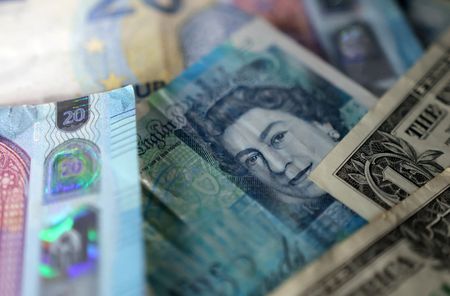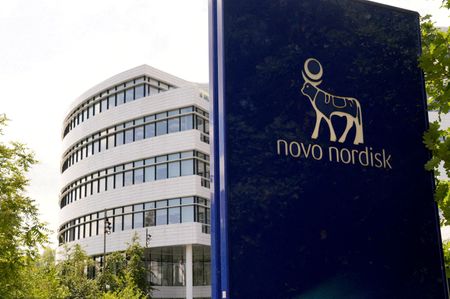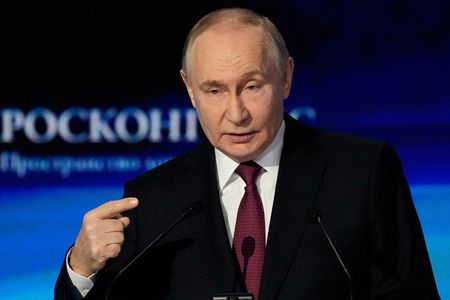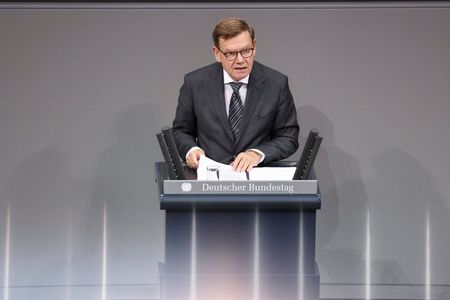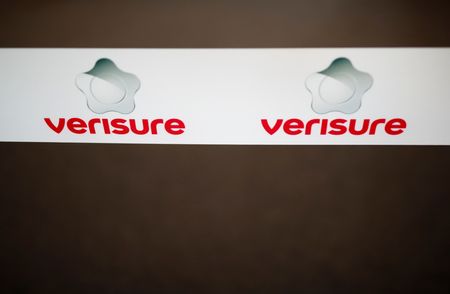By Joice Alves
LONDON (Reuters) -The boom in investment in artificial intelligence is starting to be felt for the first time in currency markets across Europe, and analysts reckon the Swedish crown and sterling stand to benefit the most.
Trading in the almost $10 trillion-a-day FX markets this year has been driven by broad dollar weakness given tariff-related concerns and U.S. rate cut expectations.
But dig deeper and the impact of AI, which has helped drive stocks to record highs, is rippling across to currencies.
According to JPMorgan, the resilience of the Swedish crown, or krona, and sterling in recent months may be partially attributable to tech as Sweden and Britain stand out on measures of AI investment and their currencies are receiving a tailwind from this dynamic, even if only a small one.
By one measure, the UK and Sweden received just over $4 billion each last year in private AI investments, ranking third and fourth in a Stanford University AI index of biggest beneficiaries of such investments, behind the United States and China.
Sweden’s krona is the strongest-performing major European currency against a weak dollar so far this year, having climbed almost 15%. Sterling has rallied 7%.
Dissecting the exact impact of AI on currency moves is hard, analysts say, given other factors at play such as interest rate expectations or fiscal unease, especially with sterling.
“Large AI investments have been announced for both countries,” said Rabobank’s head of FX strategy Jane Foley. “The inward investment could certainly have created some demand for sterling and Swedish crown respectively and created some resilience”.
The crown is also up against the euro and other Scandinavian currencies. Sterling, hurt by fiscal worries, is down against the euro and Swiss franc, however.
Investments in Swedish AI companies, which bring higher demand for crowns, would cause a visible spike in the currency, while the impact of such investments on sterling would be less visible because it is already so heavily traded, Rabobank’s Foley said.
Sterling is the world’s fourth most-traded currency, accounting for just over 10% of all trades, while Sweden’s crown accounts for less than 2%, according to the Bank for International Settlements.
BIG PROMISES
Britain and the United States last month agreed a technology pact, with top U.S. firms led by Microsoft pledging 31 billion pounds ($42 billion) in UK investments.
AI giant Nvidia plans to provide its data centre platform to Swedish companies including telecoms gear maker Ericsson, and drug developer AstraZeneca. Microsoft, Facebook’s owner Meta, Google’s owner Alphabet and Canada’s Brookfield Asset Management plan data centres in Sweden given the country’s reliable electricity supplies and infrastructure.
While it’s too soon to say what impact AI will have on economic growth or unemployment, which could potentially add to strains on public finances, the announcements offered a favourable backdrop for the krona and sterling, analysts said.
A report by SEB released earlier this year looking at major Swedish participants in the FX market showed their net overweight position in the crown was close to record highs.
Societe Generale head of corporate research for FX and rates Kenneth Broux said U.S. tech investment pledges can diminish pessimism ahead of Britain’s November budget, when taxes are expected to rise, lifting sterling’s appeal.
Latest CFTC positioning shows investors are neither heavily in favour nor against sterling. Speculators have eroded bullish dollar positions against the pound from August’s almost three-year high of $3.3 billion to just $165 million, reflecting waning conviction that the greenback will rally against sterling.
“What AI does potentially change is the outlook for productivity growth, the Achilles’ heel of the UK economy”, said Broux.
An aging population in the West opens the door to “reskilling and upskilling” which can help keep a lid on welfare payments and potential unemployment benefits caused by AI, he added.
Some are broadly positive on sterling. Investment firm St James’s Place has an overweight position. Deutsche Bank expects sterling to rise to $1.45 over the next couple of years, compared with roughly $1.34 currently.
And HSBC Private Bank’s global CIO Willem Sels said that while his near-term view on sterling was not too positive given the looming budget, he sensed that investor sentiment towards the UK was more “constructive” than it appears.
“One of the reasons for that is that people see the UK as a relatively interesting destination for AI-related investment,” Sels said.
“This is why we also saw (Nvidia CEO) Jensen Huang sitting next to the Prime Minister (Keir Starmer earlier this year) and talking about the strength of the UK.”
(Reporting by Joice Alves; Editing by Dhara Ranasinghe and Hugh Lawson)

